33 Transition Words and Phrases
Transitional terms give writers the opportunity to prepare readers for a new idea, connecting the previous sentence to the next one.
Many transitional words are nearly synonymous: words that broadly indicate that “this follows logically from the preceding” include accordingly, therefore, and consequently . Words that mean “in addition to” include moreover, besides, and further . Words that mean “contrary to what was just stated” include however, nevertheless , and nonetheless .
as a result : THEREFORE : CONSEQUENTLY
The executive’s flight was delayed and they accordingly arrived late.
in or by way of addition : FURTHERMORE
The mountain has many marked hiking trails; additionally, there are several unmarked trails that lead to the summit.
at a later or succeeding time : SUBSEQUENTLY, THEREAFTER
Afterward, she got a promotion.
even though : ALTHOUGH
She appeared as a guest star on the show, albeit briefly.
in spite of the fact that : even though —used when making a statement that differs from or contrasts with a statement you have just made
They are good friends, although they don't see each other very often.
in addition to what has been said : MOREOVER, FURTHERMORE
I can't go, and besides, I wouldn't go if I could.
as a result : in view of the foregoing : ACCORDINGLY
The words are often confused and are consequently misused.
in a contrasting or opposite way —used to introduce a statement that contrasts with a previous statement or presents a differing interpretation or possibility
Large objects appear to be closer. Conversely, small objects seem farther away.
used to introduce a statement that is somehow different from what has just been said
These problems are not as bad as they were. Even so, there is much more work to be done.
used as a stronger way to say "though" or "although"
I'm planning to go even though it may rain.
in addition : MOREOVER
I had some money to invest, and, further, I realized that the risk was small.
in addition to what precedes : BESIDES —used to introduce a statement that supports or adds to a previous statement
These findings seem plausible. Furthermore, several studies have confirmed them.
because of a preceding fact or premise : for this reason : THEREFORE
He was a newcomer and hence had no close friends here.
from this point on : starting now
She announced that henceforth she would be running the company.
in spite of that : on the other hand —used when you are saying something that is different from or contrasts with a previous statement
I'd like to go; however, I'd better not.
as something more : BESIDES —used for adding information to a statement
The city has the largest population in the country and in addition is a major shipping port.
all things considered : as a matter of fact —used when making a statement that adds to or strengthens a previous statement
He likes to have things his own way; indeed, he can be very stubborn.
for fear that —often used after an expression denoting fear or apprehension
He was concerned lest anyone think that he was guilty.
in addition : ALSO —often used to introduce a statement that adds to and is related to a previous statement
She is an acclaimed painter who is likewise a sculptor.
at or during the same time : in the meantime
You can set the table. Meanwhile, I'll start making dinner.
BESIDES, FURTHER : in addition to what has been said —used to introduce a statement that supports or adds to a previous statement
It probably wouldn't work. Moreover, it would be very expensive to try it.
in spite of that : HOWEVER
It was a predictable, but nevertheless funny, story.
in spite of what has just been said : NEVERTHELESS
The hike was difficult, but fun nonetheless.
without being prevented by (something) : despite—used to say that something happens or is true even though there is something that might prevent it from happening or being true
Notwithstanding their youth and inexperience, the team won the championship.
if not : or else
Finish your dinner. Otherwise, you won't get any dessert.
more correctly speaking —used to introduce a statement that corrects what you have just said
We can take the car, or rather, the van.
in spite of that —used to say that something happens or is true even though there is something that might prevent it from happening or being true
I tried again and still I failed.
by that : by that means
He signed the contract, thereby forfeiting his right to the property.
for that reason : because of that
This tablet is thin and light and therefore very convenient to carry around.
immediately after that
The committee reviewed the documents and thereupon decided to accept the proposal.
because of this or that : HENCE, CONSEQUENTLY
This detergent is highly concentrated and thus you will need to dilute it.
while on the contrary —used to make a statement that describes how two people, groups, etc., are different
Some of these species have flourished, whereas others have struggled.
NEVERTHELESS, HOWEVER —used to introduce a statement that adds something to a previous statement and usually contrasts with it in some way
It was pouring rain out, yet his clothes didn’t seem very wet.

Word of the Day
See Definitions and Examples »
Get Word of the Day daily email!
Games & Quizzes

Usage Notes
Prepositions, ending a sentence with, hypercorrections: are you making these 6 common mistakes, a comprehensive guide to forming compounds, can ‘criteria’ ever be singular, singular nonbinary ‘they’: is it ‘they are’ or ‘they is’, grammar & usage, 7 pairs of commonly confused words, did we change the definition of 'literally', more commonly mispronounced words, the tangled history of 'it's' and 'its', more commonly misspelled words, 10 bird names that sound like insults (and sometimes are), eavesdrop, fiasco, and 8 more words with surprising origins, 'when pigs fly' and other barnyard idioms, the words of the week - mar. 29, 9 superb owl words.
- Try for free
Transition Words and Phrases for Writing
Use this list of 100+ high school transition words and phrases for instances where you need to provide comparison/contrast, summarization, conclusion, or to indicate more information., transition words for high school essays.
In this guide, we explore high school transition words. Transition words play a crucial role in structuring and bridging ideas in writing. They are the glue that binds sentences and paragraphs together, ensuring a smooth flow of thoughts and concepts.
The importance of these words cannot be underestimated, especially in high school writing, where complexity and cohesiveness of ideas start to play a more significant role.
This guide will provide an in-depth look into various categories of transition words and how to use them effectively in your writing.
What are transition words?
Transition words are functional parts of speech that writers use to help readers move easily and clearly from one idea to another. They add necessary organization and structure to a text, and they are critical for creative, expository, or academic writing.
Successful writers use common transition words and phrases in both fiction and non-fiction works.
Why do we use transition words?
Also called connecting or linking words, transition words and phrases help establish clear connections between ideas and ensure that sentences and paragraphs flow together smoothly , making them easier to read.
Examples of high school transition words
Using transitional words properly is crucial to the development of good writing composition skills. By the 8th grade and high school, students should have a strong grasp of common transition words and use them in their essays.
Use the following words and phrases in the following circumstances.
Cause, purpose, or intent transition words
Here is a list of transition words/linking words and phrases when you want to indicate cause, intent, or condition. They can be coordinating conjunctions, prepositions, adverbs, etc.
Example: "We can probably finish this hike in less than two hours, as long as we stick to the marked trails and don't stop too often to rest."
Types of transition words for cause, purpose, and intent:
- For the reason that
- For the purpose of
- In order to
- In light of
- On condition of
- Out of fear of
- On account of
- Provided that
Effect, consequence, or result transition words
These connecting words and phrases demonstrate effects or results, cause and effect, and are sometimes used to denote consequences that occur after the fact (using time words like "after" and "then"). They are predominantly conjunctive adverbs and are mostly used when starting a new paragraph.
Example: "Kevin never changed the oil in his car - as a result , the engine seized and he had to pay $2000 to get it replaced."
Use transition words for better accessibility. Below are some examples of transitional expressions:
- Accordingly
- Consequently
- In that case
- As a result
- Due to circumstances
- Because of that
- In light of that
- For that reason
Comparison or agreement transition words
These transition phrases and words reinforce the concepts and ideas directly preceding them, or enable the reader to directly compare two preceding statements, previous arguments, ideas, or concepts.
Example: "Needing to gain only 2 yards for a critical first down, the coach was faced with going for it or kicking the ball away. Calling a pass play seemed the safest bet. Moreover , the quarterback hadn't thrown an incomplete pass all game."
Check the following examples:
- Comparatively
- In similar fashion
- Identically
- Furthermore
- In addition
- In the same vein
- Additionally
- As a matter of fact
- First of all
- In the first place
- Compared to
- In the same way
- In addition to
- Part and parcel of
- By the same token
Contrast or contradiction words & phrases
Use these transition words and phrases to point out differences in ideas, or suggest to the reader that there are alternative ideas to consider.
Example: "The coach decided to go for it on 4th down, albeit with a very simple quarterback sneak."
- In spite of
- Nonetheless
- Nevertheless
- Be that as it may
- On the contrary
- Even though
- Rather than
- At the same time
- In contrast with
Sequence and time transition words
Convey a sequence of events or the structure and limits of time with these transition words.
Example: "Attention, passengers: At the present time , the subway is delayed because of a signal issue at the Ashmont station."
- At the present time
- Immediately
- Simultaneously
- Subsequently
- To begin with
- All of a sudden
- In an instant
- Once in awhile
- Right this minute
- Not a second too soon
Transition words for place and location
Indicate location, presence, and state with these transition words.
Example: "The town finally voted to build a new high school adjacent to the old railway station."
- In the background
- To the right/left
- In the back/front
- In front of
- In proximity to
- Kitty-corner to/from
- Across from
- In the vicinity of
- On the horizon
- In the distance
Summarizing and concluding transition words
Use these connecting words and phrases to summarize ideas and concepts, convey conclusions to readers, or restate particular ideas and concepts.
Example: " Generally speaking , commuting into the city usually takes me an hour, except on rainy or snowy days, when it can take as many as 3 hours to get to work."
- To summarize
- In the final analysis
- For the most part
- At the end of the day
- After all is said and done
- By and large
- In the short run
- All things considered
- In conclusion
- To conclude
- As demonstrated
- As discussed
- As indicated
Transition words for examples, emphasis, and more information
This group of linking words and phrases will help illustrate, add more information, and provide examples for readers.
Example: "There were a number of accidents and breakdowns on the highway today - surprisingly , I still made it to school on time."
- For example
- For instance
- In particular
- Particularly
- Specifically
- To illustrate
- To demonstrate
- For this reason
- In this case
- Putting it another way
- By all means
- Hypothetically
- Putting it differently
- Significantly
Keep practicing!
Transition words are essential tools for enhancing the cohesiveness and flow of your writing. Learning and effectively using these high school transition words will not only improve your writing skills but also increase your ability to communicate your ideas clearly and logically.
Keep practicing and enriching your writing with these high school transition words and phrases.
Featured High School Resources

Related Resources

Essay Writing Guide
Transition Words For Essays
Transition Words For Essays - The Ultimate List
11 min read
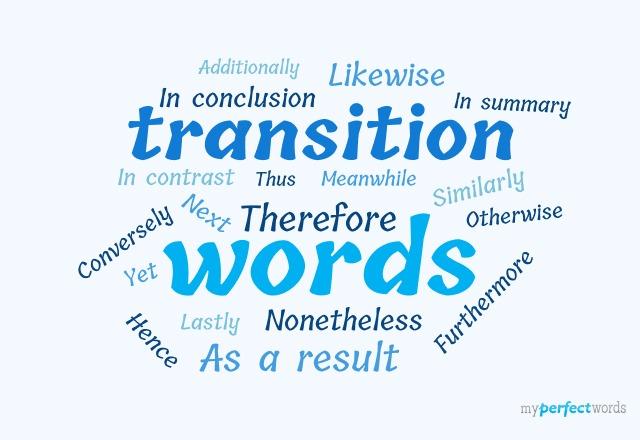
People also read
An Easy Guide to Writing an Essay
Learn How to Write An Essay in Simple Steps
A Complete 500 Word Essay Writing Guide
A Catalog of 500+ Essay Topics for Students
Explore Different Types of Essays, their Purpose, and Sub-types
Essay Format: A Basic Guide With Examples
Learn How to Create a Perfect Essay Outline
How to Start an Essay- A Step-by-Step Guide
A Complete Essay Introduction Writing Guide With Examples
20+ Hook Examples to Grab Reader’s Attention
The Ultimate Guide to Writing Powerful Thesis Statement
20+ Thesis Statement Examples for Different Types of Essays?
How to Write a Topic Sentence: Purpose, Tips & Examples
Learn How to Write a Conclusion in Simple Steps
4 Types of Sentences - Definition & Examples
Writing Conventions - Definition, Tips & Examples
Essay Writing Problems - 5 Most Paralyzing Problems
How to Make an Essay Longer: 14 Easy Ways
How to Title an Essay - A Detailed Guide
1000 Word Essay - A Simple Guide With Examples
Do you find it challenging to make your essays flow smoothly and hold your readers' attention from start to finish? Are your paragraphs disjointed, leaving your writing feeling unpolished?
It can be frustrating when your ideas don't connect seamlessly. You might wonder how to make your writing shine and ensure it leaves a lasting impression on your professors.
Don't worry; we've got you covered!
In this guide, we'll introduce you to transition words for essays. These words are your secret weapon for crafting well-structured, compelling essays that will impress your teachers and elevate your writing game. Let's get started!
- 1. What are Good Transition Words for Essays?
- 2. Examples of Different Types of Transition Words
- 3. Transition Words for Argumentative Essays
- 4. Transition Words for Persuasive Essays
- 5. Transition Words for Compare and Contrast Essays
- 6. Transition Words for Informative Essays
- 7. Transition Words for Expository Essays
- 8. Transition Words for Cause and Effect Essays
- 9. Transition Words for Synthesis Essays
- 10. Transition Words for Analysis Essays
- 11. Conclusion Transition Words for Essays
- 12. Beginning Transition Words for Essays
- 13. Paragraph Transition Words for Essays
- 14. Transition Words for Quotes in Essays
- 15. Transition Words for Essays Middle School
- 16. Transition Words for Essays High School
- 17. Transition Words for Essays College
- 18. Do’s and Don’ts of Using Transition Words
What are Good Transition Words for Essays?
Transition words are essential tools in essay writing , providing a clear path for your readers to follow. They serve the crucial purpose of connecting words, phrases, sentences, or even entire paragraphs.
By using these transitions effectively, you can effortlessly convey your ideas and thoughts in a coherent and easily understandable manner.
However, it's crucial to exercise moderation when using transition words. Overusing them can clutter your essay, making it confusing and difficult to read.
On the other hand, omitting them entirely can result in a piece that lacks flow and direction. Striking the right balance ensures that your essay is both engaging and comprehensible.
Purpose of Transition Words
Let’s take a look at the purpose of using transitions in essays:
- Enhance Readability: Transition words improve the overall flow and coherence of your writing.
- Clarify Relationships: They signal connections between ideas, whether it's adding, contrasting, or summarizing.
- Improve Comprehension: Readers can follow your argument or narrative more easily.
- Smooth Transitions: They act as bridges, seamlessly guiding your audience from one point to the next.
- Manage Change: They prepare the reader for shifts in topic or perspective.
- Enhance Engagement: Well-placed transitions keep readers interested and invested in your content.
- Encourage Flow: They maintain a logical progression, aiding in the overall structure of your work.
Examples of Different Types of Transition Words
Here are some common types of transitions for essays that can be used in almost any situation.
Addition Transitions
- Furthermore
- Additionally
- In addition
- Not only...but also
Comparison Transitions
- In the same way
- Comparable to
- Correspondingly
- In comparison
- By the same token
Contrast Transitions
- On the other hand
- In contrast
- Nevertheless
- Nonetheless
- Even though
Cause and Effect Transitions
- Consequently
- As a result
- For this reason
- Accordingly
Time Transitions
- Simultaneously
- In the meantime
- Subsequently
- At the same time
Illustration Transitions
- For example
- For instance
- Specifically
- To illustrate
- In particular
- In this case
- As an illustration
Emphasis Transitions
- Undoubtedly
- Without a doubt
Summary Transitions
- To summarize
- To conclude
Sequence Transitions
Example transitions.
- As an example
- To demonstrate
- For one thing
- As evidence
- As an instance
For Showing Exception
- At The Same Time
- Nevertheless
- On The Other Hand
- But At The Same Time
- Conversely
For Proving
- For This Reason
- Certainly
- To Demonstrate
- In Fact
- Clearly
- As A Result
This transition words for essays list will make it easier for you to understand what words to use in which kind of essay or for which purpose.
Transition Words for Argumentative Essays
- To begin with
- By contrast
- One alternative is
- To put more simply
- On the contrary
- With this in mind
- All things considered
- Generally speaking
- That is to say
- Yet another
Transition Words for Persuasive Essays
- furthermore
- Moreover
- Because
- Besides that
- Pursuing this further
Transition Words for Essays PDF
Transition Words for Compare and Contrast Essays
- Althoughyhtjyjum,u
- Notwithstanding
Transition Words for Informative Essays
- After all
- As can be expected
- Obviously
Transition Words for Expository Essays
- Equally important
- Another reason
- Not long after that
- Looking back
Transition Words for Cause and Effect Essays
- In order to
- Provided that
- Because of this
Transition Words for Synthesis Essays
- As noted earlier
- Consequently
- Whereas
- This leads to
- Another factor
- This lead to
- The underlying concept
- In this respect
Transition Words for Analysis Essays
- (once) again
- Primarily
- Due to
- Accordingly
- That is to say
- Subsequently
- To demonstrate
- However
Conclusion Transition Words for Essays
- In any event
- As mentioned
- In other words
- As you can see
Beginning Transition Words for Essays
These are some introduction transition words for essays to start writing:
- In the first place
- First of all
- For the most part
- On one hand
- As a rule
Paragraph Transition Words for Essays
- To put it differently
- Once and for all
Transition Words for Essay’s First Body Paragraph
- To start with
- First and foremost
- In the beginning
Transition Words for Essay’s Second Body Paragraph
- In addition to this
- Furthermore
Transition Words for Essay’s Last Body Paragraph
- In conclusion
- Finally
- Last but not least
- To sum up
- Altogether
Transition Words for Quotes in Essays
- Acknowledges
Transition Words for Essays Middle School
- In conclusion
- For instance
Transition Words for Essays High School
- Today
- In addition
- To summarize
- On the other hand
- As well as
- Although
Transition Words for Essays College
Here are some college level transition words for essay:
- Pursuing this
- Similarly
- What’s more
- As much as
- In a like manner
- In the same fashion
Do’s and Don’ts of Using Transition Words
So, now you have some strong transition words for essays at hand. But how do you use these transition words?
Here are the basic dos and don’ts of using transition words for essays.
- Understand that these terms are an important part of any type of essay or paper, adding to its overall flow and readability.
- Use these words when you are presenting a new idea. For example, start a new paragraph with these phrases, followed by a comma.
- Do not overuse transition words. It is one of the most common essay writing problems that students end up with. It is important to only use those words required to convey your message clearly. It is good to sound smart by using these words but don’t overdo it.
- Avoid using these words at the start and in the middle. Always try to use transition words only a few times where it is necessary to make it easy for the readers to follow the ideas.
So, now you have an extensive list of transition words. These are some of the best transition words for essays that you can add to your essays.
If your essay seems redundant because you used similar transition words, you can always have a look at this list to find some good replacements.
So, whenever you’re writing an essay, refer back to this list and let your words flow!
If you still feel that your essay is not properly conveying your ideas, turn to our expert essay writers at MyPerfectWords.com.
If you have some write-up, our essay writing service will make it flow without changing the entire content. Or, if you wish to have an essay from scratch, we will write a paper for you!
Simply contact us and place your order now. Our writers will take care of everything to help you ace your assignment.

Write Essay Within 60 Seconds!

Nova Allison is a Digital Content Strategist with over eight years of experience. Nova has also worked as a technical and scientific writer. She is majorly involved in developing and reviewing online content plans that engage and resonate with audiences. Nova has a passion for writing that engages and informs her readers.

Paper Due? Why Suffer? That’s our Job!
Keep reading

Have a language expert improve your writing
Run a free plagiarism check in 10 minutes, generate accurate citations for free.
- Knowledge Base
- Transition sentences | Tips & examples for clear writing
Transition Sentences | Tips & Examples for Clear Writing
Published on June 9, 2020 by Jack Caulfield . Revised on July 23, 2023.
Clear transitions are crucial to clear writing: They show the reader how different parts of your essay, paper, or thesis are connected. Transition sentences can be used to structure your text and link together paragraphs or sections.
… In this case, the researchers concluded that the method was unreliable.
However , evidence from a more recent study points to a different conclusion . …
Instantly correct all language mistakes in your text
Upload your document to correct all your mistakes in minutes

Table of contents
Transitioning between paragraphs, transitioning to a new section, transitions within a paragraph, other interesting articles.
When you start a new paragraph , the first sentence should clearly express:
- What this paragraph will discuss
- How it relates to the previous paragraph
The examples below show some examples of transition sentences between paragraphs and what they express.
Placement of transition sentences
The beginning of a new paragraph is generally the right place for a transition sentence. Each paragraph should focus on one topic, so avoid spending time at the end of a paragraph explaining the theme of the next one.
The first dissenter to consider is …
However, several scholars dissent from this consensus. The first one to consider is …
Receive feedback on language, structure, and formatting
Professional editors proofread and edit your paper by focusing on:
- Academic style
- Vague sentences
- Style consistency
See an example

While transitions between paragraphs are generally a single sentence, when you start a new section in a longer text, you may need an entire transition paragraph. Transitioning to a new section involves summarizing the content of the previous section and expressing how the new one will build upon or depart from it.
For example, the following sentences might be an effective transition for a new section in a literary analysis essay.
Having established that the subjective experience of time is one of Mann’s key concerns in The Magic Mountain , it is now possible to explore how this theme facilitates the novel’s connection with World War I. The war itself is not narrated in the book, but rather hinted at as something awaiting Castorp beyond the final pages. In this way, Mann links his protagonist’s subjective experience of time to more than just his illness; it is also used to explore the period leading up to the outbreak of war.
As in academic writing generally, aim to be as concise as you can while maintaining clarity: If you can transition to a new section clearly with a single sentence, do so, but use more when necessary.
It’s also important to use effective transitions within each paragraph you write, leading the reader through your arguments efficiently and avoiding ambiguity.
The known-new contract
The order of information within each of your sentences is important to the cohesion of your text. The known-new contract , a useful writing concept, states that a new sentence should generally begin with some reference to information from the previous sentence, and then go on to connect it to new information.
In the following example, the second sentence doesn’t follow very clearly from the first. The connection only becomes clear when we reach the end.
By reordering the information in the second sentence so that it begins with a reference to the first, we can help the reader follow our argument more smoothly.
Note that the known-new contract is just a general guideline. Not every sentence needs to be structured this way, but it’s a useful technique if you’re struggling to make your sentences cohere.
Transition words and phrases
Using appropriate transition words helps show your reader connections within and between sentences. Transition words and phrases come in four main types:
- Additive transitions, which introduce new information or examples
- Adversative transitions, which signal a contrast or departure from the previous text
- Causal transitions, which are used to describe cause and effect
- Sequential transitions, which indicate a sequence
The table below gives a few examples for each type:
Grouping similar information
While transition words and phrases are essential, and every essay will contain at least some of them, it’s also important to avoid overusing them. One way to do this is by grouping similar information together so that fewer transitions are needed.
For example, the following text uses three transition words and jumps back and forth between ideas. This makes it repetitive and difficult to follow.
Rewriting it to group similar information allows us to use just one transition, making the text more concise and readable.
If you want to know more about AI tools , college essays , or fallacies make sure to check out some of our other articles with explanations and examples or go directly to our tools!
- Ad hominem fallacy
- Post hoc fallacy
- Appeal to authority fallacy
- False cause fallacy
- Sunk cost fallacy
College essays
- Choosing Essay Topic
- Write a College Essay
- Write a Diversity Essay
- College Essay Format & Structure
- Comparing and Contrasting in an Essay
(AI) Tools
- Grammar Checker
- Paraphrasing Tool
- Text Summarizer
- AI Detector
- Plagiarism Checker
- Citation Generator
Cite this Scribbr article
If you want to cite this source, you can copy and paste the citation or click the “Cite this Scribbr article” button to automatically add the citation to our free Citation Generator.
Caulfield, J. (2023, July 23). Transition Sentences | Tips & Examples for Clear Writing. Scribbr. Retrieved March 25, 2024, from https://www.scribbr.com/academic-essay/transition-sentences/
Is this article helpful?

Jack Caulfield
Other students also liked, transition words & phrases | list & examples, how to write topic sentences | 4 steps, examples & purpose, academic paragraph structure | step-by-step guide & examples, what is your plagiarism score.

70+ Transition words for essays with examples
Transition words for essays.
Ever stared at a blank page, your thoughts swirling like a disorganized storm? Crafting a compelling essay often hinges on smooth transitions between ideas. Fear not, fellow writer! Here’s your guide to essential transition words , those linguistic gems that bridge the gaps in your essay and create a clear, logical flow.
List of Transition words for essays
- Additionally
- Furthermore
- In addition
- In the same way
- In other words
- That is to say
- For example
- For instance
- Specifically
- To illustrate
- In particular
- Without a doubt
- Essentially
- In conclusion
- To conclude
- On the whole
- Consequently
- Accordingly
- As a result
- For this reason
- Because of this
- Due to this
- In light of this
- Considering that
- Seeing that
- As a matter of fact
- Nonetheless
- Nevertheless
- Even though
- In spite of
- On the contrary
Transition words for essays with examples
Here are examples of sentences using each of the transition words for cause:
- Additionally : “She enjoys playing the piano. Additionally, she is proficient in playing the guitar.”
- Furthermore : “The research indicated a positive correlation between exercise and mental health. Furthermore, it suggested that regular physical activity reduces stress levels.”
- Moreover : “The company reported an increase in sales for the third quarter. Moreover, profits also saw a significant rise.”
- In addition : “He enjoys outdoor activities such as hiking and camping. In addition, he is passionate about photography.”
- Also : “He enjoys playing tennis. Also, he participates in swimming competitions.”
- Likewise : “She volunteered at the local shelter. Likewise, her brother also dedicated his time to community service.”
- Similarly : “The team implemented new strategies to improve productivity. Similarly, other departments adopted similar approaches.”
- In the same way : “She excels in academics. In the same way, her siblings also achieve high grades.”
- Equally : “Both candidates possess strong leadership skills. Equally, they demonstrate excellent communication abilities.”
- Besides : “She enjoys reading novels. Besides, she also enjoys writing short stories.”
- In other words : “The product received mixed reviews due to its functionality issues. In other words, customers experienced difficulties with its performance.”
- That is to say : “She loves traveling to exotic destinations. That is to say, she prefers exploring off-the-beaten-path locations.”
- Namely : “The research focused on several key areas, namely, customer satisfaction, product quality, and market trends.”
- For example : “Many countries have implemented strict environmental policies. For example, Denmark has achieved significant progress in renewable energy.”
- For instance : “Some popular social media platforms, for instance, Facebook and Instagram, have millions of active users.”
- Specifically : “The training program focuses specifically on enhancing leadership skills and fostering teamwork.”
- To illustrate : “To illustrate the concept further, let’s consider a real-life example.”
- In particular : “The company aims to expand its operations globally. In particular, it plans to target emerging markets in Asia.”
- In fact : “Contrary to popular belief, exercise is not only beneficial for physical health but also for mental well-being. In fact, it has been shown to reduce symptoms of depression and anxiety.”
- Indeed : “The company’s efforts to promote diversity have yielded positive results. Indeed, diversity has been linked to increased innovation and creativity.”
- Actually : “Contrary to what many people believe, the situation is actually quite different.”
- Truly : “She was truly dedicated to her work and always gave her best effort.”
- Certainly : “The results of the study certainly support the hypothesis.”
- Of course : “Of course, you are welcome to join us for dinner.”
- Without a doubt : “Without a doubt, she is one of the most talented musicians I’ve ever met.”
- In essence : “The policy change, in essence, aims to improve customer satisfaction.”
- Essentially : “The project, essentially, involves redesigning the user interface.”
- In summary : “In summary, the findings suggest a need for further research in this area.”
- In conclusion : “In conclusion, it is evident that climate change poses significant challenges.”
- To sum up : “To sum up, the main points of the argument are as follows.”
- In brief : “In brief, the report highlights key areas for improvement.”
- To conclude : “To conclude, let’s consider the implications of these findings.”
- Overall : “Overall, the project was a success.”
- All in all : “All in all, it was a memorable experience.”
- On the whole : “On the whole, the feedback has been positive.”
- Therefore : “The traffic was heavy; therefore, they arrived late to the meeting.”
- Thus : “The factory implemented new safety measures; thus, the number of accidents decreased.”
- Hence : “The flight was canceled; hence, they had to make alternative travel arrangements.”
- Consequently : “He missed the deadline; consequently, he faced disciplinary action.”
- Accordingly : “The instructions were unclear; accordingly, many participants made mistakes.”
- As a result : “The market demand increased; as a result, prices rose.”
- For this reason : “She forgot her umbrella; for this reason, she got wet in the rain.”
- Because of this : “He missed the train because of this, he couldn’t attend the meeting.”
- Due to this : “Due to this unforeseen circumstance, the event had to be postponed.”
- In light of this : “In light of this new information, we need to reconsider our strategy.”
- Since : “Since it was raining heavily, they decided to stay indoors.”
- Because : “He didn’t study for the exam because he was feeling unwell.”
- For : “He received a promotion for his outstanding performance.”
- As : “As the temperature dropped, people bundled up in warm clothing.”
- Owing to : “Owing to his persistent efforts, he achieved success.”
- Given that : “Given that she had prior experience, she was appointed as the team leader.”
- Considering that : “Considering that it was his first attempt, he performed exceptionally well.”
- Seeing that : “Seeing that the store was closing soon, they hurried to finish their shopping.”
- In view of : “In view of the current situation, we need to take immediate action.”
- As a matter of fact : “As a matter of fact, he was the first to arrive at the party.”
- Regardless : “He continued with the project regardless of the challenges he faced.”
- Nonetheless : “The weather was unfavorable; nonetheless, they decided to go ahead with the outdoor event.”
- Nevertheless : “The plan faced criticism; nevertheless, it was implemented successfully.”
- However : “She forgot her passport; however, she managed to board the flight with a temporary permit.”
- Although : “Although it was raining, they decided to go for a walk.”
- Though : “Though she was tired, she continued working late into the night.”
- Even though : “Even though he was warned about the risks, he proceeded with the plan.”
- Despite : “Despite the challenges, they remained committed to their goal.”
- In spite of : “In spite of the obstacles, they persevered and succeeded.”
- On the contrary : “The results were contrary to expectations; on the contrary, they were favorable.”
- Conversely : “He expected to feel relieved; conversely, he felt even more anxious.”
- But : “The weather was sunny, but they decided to cancel the picnic due to other commitments.”
- Yet : “He had a busy schedule, yet he managed to find time for his hobbies.”
- Whereas : “She preferred coffee, whereas her sister preferred tea.”

By mastering the art of transition words, you’ll transform your essay from a disjointed collection of ideas into a powerful and persuasive piece of writing. So, the next time you sit down to write, remember these transition words and watch your essay flow majestically!
Download the Word of the day
Related Posts:
- 200+ Sentences with Besides
- Conjunctive Adverbs
- Transition Phrases
- Ways to Say “I Really Appreciate It”
- Happy Promise Day 2024: Wishes, Quotes, and Messages
- Transition words for sequencing with examples
- The Power of Transition Words and Phrases
- Transition words for contrast and compare with examples

Leave a Reply Cancel reply
Your email address will not be published. Required fields are marked *
Save my name, email, and website in this browser for the next time I comment.
Download the Word coach App on your Android phone
Word Coach - IELTS and GRE Vocabulary Builder & word coach Quiz (10 Words a Day) application helps, you and your friends to improve English Vocabulary and help you become the smartest among your group.


Mastering English Writing: Top Transition Words for Paragraphs
By: Author ESLBUZZ
Posted on Last updated: February 6, 2024
Sharing is caring!
Transition words for paragraphs are essential in writing. They help to connect ideas and make the text flow more smoothly. As an English learner, mastering transition words can take your writing to the next level. In this article, we will explore the importance of transition words and provide you with a list of words and examples to help you improve your writing. Whether you’re writing an essay, a report, or even an email, using transition words can help you to express your ideas more clearly and cohesively.
Understanding Transition Words for Paragraphs

Purpose of Transition Words
Transition words are vital in the flow of discourse, allowing us to connect sentences and paragraphs in a way that makes our ideas more understandable to the reader. For example, words like “therefore” or “consequently” are used to illustrate a cause and effect relationship, while “however” or “on the other hand” introduce a contrast or opposition.
Types of Transitions
Transitions can be categorized based on the relationship they express. Here are a few types:
- Addition : These transitions add information or ideas. Examples include “furthermore,” “in addition,” and “moreover.”
- Contrast : Used to show difference or opposition. Words like “although,” “despite,” and “regardless” come into play here.
- Cause and Effect : These signify a causal relationship. Words such as “because,” “thus,” and “therefore” are part of this group.
- Sequence/Order : When we need to outline steps or a process, we use “first,” “next,” and “finally.”
List of Common Transition Words
Using transition words for paragraphs.
We often use transition words to guide readers smoothly from one point to another within our paragraphs and from paragraph to paragraph, enhancing the overall readability of our writing.
Connecting Ideas
Purpose : Transition words like “furthermore,” “similarly,” and “in addition” allow us to link individual thoughts and reinforce the connections between them. Use Case : Employ “furthermore” to add information that aligns with what has been previously stated.
Creating Flow
Purpose : Implementing words such as “however,” “on the other hand,” and “conversely” helps us introduce contrast, ensuring our paragraphs flow logically. Use Case : “However” works perfectly when we aim to present an opposing view or concept following a statement.
Signaling Relationships
Purpose : We use terms like “because,” “therefore,” and “as a result” to illustrate cause and effect. Use Case : “Therefore” signals the result of the information provided in the preceding sentence or clause.
Enhancing Clarity
Purpose : Clarity is improved with words such as “for example,” “namely,” and “to illustrate,” which help us provide specific examples or detailed explanations. Use Case : “For example” is ideal when we want to enhance our argument with concrete instances.
Common Transition Words
In crafting well-organized paragraphs, we rely on transition words to clearly and effectively link our ideas. These linguistic tools help guide readers through our arguments and explanations seamlessly. Here’s a breakdown of common transition types and examples we often use.
Addition transition words are used to add information to a sentence or paragraph. They are used to show that the information being added is related to the previous sentence or paragraph. Examples of addition transition words include:
Example: I love to travel. Additionally , I enjoy trying new foods and learning about different cultures.
Contrast transition words are used to show the differences between two ideas or concepts. They are used to highlight the differences between the previous sentence or paragraph and the current one. Examples of contrast transition words include:
Example: I love to travel. However , my friend prefers to stay at home and watch movies.
Cause and Effect
Cause and effect transition words are used to show the relationship between two ideas or events. They are used to show that one idea or event is the cause of the other. Examples of cause and effect transition words include:
Example: I missed my flight. Therefore , I had to stay at the airport overnight.
Emphasis transition words are used to emphasize a point or idea. They are used to show that the information being presented is important or significant. Examples of emphasis transition words include:
Example: The view from the top of the mountain was indeed breathtaking .
Sequential transition words are used to show the order in which events or ideas occur. They are used to show that one idea or event follows another. Examples of sequential transition words include:
Example: First , I packed my bags. Next , I checked in at the airport. Finally , I boarded the plane.
Location transition words are used to show the location or position of an object or idea. They are used to show the relationship between the previous sentence or paragraph and the current one. Examples of location transition words include:
Example: The restaurant is located adjacent to the park.
Conflict transition words are used to show a disagreement or conflict between two ideas or concepts. They are used to show that one idea or concept contradicts the other. Examples of conflict transition words include:
Example: Although I wanted to go to the beach, it was too cold to swim.
Concession transition words are used to show that the writer or speaker is conceding a point. They are used to show that the writer or speaker acknowledges the opposing point of view. Examples of concession transition words include:
Example: Admittedly , I am not an expert in this field.
Continuation
Continuation transition words are used to continue a thought or idea. They are used to show that the writer or speaker is continuing to discuss the same topic. Examples of continuation transition words include:
Example: I love to travel. Also , I enjoy trying new foods and learning about different cultures.
Resumption transition words are used to resume a thought or idea that was previously interrupted. They are used to show that the writer or speaker is returning to a previous topic. Examples of resumption transition words include:
Example: I was planning to go to the beach. Anyway , the weather was too cold to swim.
Frequently Asked Questions
What are some common transitional words and phrases used to connect paragraphs?
Some common transitional words and phrases used to connect paragraphs include:
How can transitional words be used to improve the flow of writing?
Transitional words can be used to improve the flow of writing by linking ideas and sentences together. They help the reader understand the relationship between different parts of the text and make it easier to follow the writer’s train of thought.
What are some transition words that can be used to introduce evidence in a paragraph?
Some transition words that can be used to introduce evidence in a paragraph include:
What are some transitional phrases that can be used to start a body paragraph?
Some transitional phrases that can be used to start a body paragraph include:
How can transition words help to make an argumentative essay more persuasive?
Transition words can help to make an argumentative essay more persuasive by making it easier for the reader to follow the writer’s argument. They can be used to link different parts of the essay together and show how each point supports the writer’s overall position.
What are some other words that can be used as transitional phrases besides ‘also’ and ‘but’?
Some other words that can be used as transitional phrases include:
In conclusion, transitional words and phrases are essential for connecting ideas and sentences together in a piece of writing. By using them effectively, writers can improve the flow of their writing and make it easier for readers to follow their train of thought.
"}},{"@type":"Question","name":"How can transitional words be used to improve the flow of writing?","acceptedAnswer":{"@type":"Answer","text":"
Transitional words can be used to improve the flow of writing by linking ideas and sentences together. They help the reader understand the relationship between different parts of the text and make it easier to follow the writer's train of thought.
"}},{"@type":"Question","name":"What are some transition words that can be used to introduce evidence in a paragraph?","acceptedAnswer":{"@type":"Answer","text":"
"}},{"@type":"Question","name":"What are some transitional phrases that can be used to start a body paragraph?","acceptedAnswer":{"@type":"Answer","text":"
"}},{"@type":"Question","name":"How can transition words help to make an argumentative essay more persuasive?","acceptedAnswer":{"@type":"Answer","text":"
Transition words can help to make an argumentative essay more persuasive by making it easier for the reader to follow the writer's argument. They can be used to link different parts of the essay together and show how each point supports the writer's overall position.
"}},{"@type":"Question","name":"What are some other words that can be used as transitional phrases besides 'also' and 'but'?","acceptedAnswer":{"@type":"Answer","text":"
- Recent Posts
- Mastering English Writing: Essential Transitional Words for Body Paragraphs - March 25, 2024
- 100+ Essential Contrast Transition Words for Exceptional English Writing - March 25, 2024
- Short E Words: Enhance Your Vocabulary with Easy Examples - March 23, 2024
Related posts:
- O Words to Describe Someone: Adjectives Starting with O to Describe Someone
- Boost Your Vocabulary with Positive Descriptive Words
- Sexuality Words: A Comprehensive Guide to Sexual Terminalogy
- These Sound Words Will Make Your Speech Sound Magical
190 Good Transition Words for Essays
August 23, 2023

Essay writing consists of two primary procedures: coming up with the content we want to include and structuring that content. These procedures might take place in either order or they could occur simultaneously. When writing an essay it is important to think about the ways that content and structure complement one another. The best essays join these two elements in thoughtful ways. Transition words for essays (including for college essays) are some of our most primary tools when it comes to structuring a piece of writing.
When beginning an essay it is often recommended to begin with a messy first draft. The purpose of this draft is to get everything out on the page. You should put down as many ideas and trajectories as you can without worrying too much about phrasing or whether they will make it into the final draft. The key here is to be loose—to get ahead of our self-editors and expel everything we can from our minds.
List of Good Transition Words for Essays (Continued)
While this is a good strategy for beginning an essay it will likely leave you unsure how everything fits together. This is where transition words come in. As you will see in this list (which is necessarily incomplete) the range of transition words for essays is vast. Each transition word implies a different relation, often in subtle ways. After accumulating content, the next step is to figure out how the elements fit together towards an overall goal (this could be but is not necessarily an “argument”). Consulting this list of transition words for essays can provide a shortcut for determining how one piece might lead into another. Along with transition words, rhetorical devices and literary devices are other tools to consider during this stage of essay writing.
Transition Words for College Essays
While this list will be a useful tool for all types of essay writing it will be particularly helpful when it comes to finding the right transition words for college essays . The goal of a college essay is to give a strong overall sense of its author in the tight space of 650 words. As you might imagine, it’s not easy to encompass a life or convey a complex personality in such a space. When writing a college essay you are working with a huge amount of potential content. Students often want to squeeze in as much as they can. To this end, transition words for college essays are essential tools to have at our disposal.
Here is our list of transition words for college essays and other essays. It is organized by the different types of transition words/phrases and their functions. While this organization should be convenient, keep in mind that there’s plenty of overlap. Many of these words can function in multiple ways.
1) Additive Transitions
These words function in an additive manner, accumulating content to build upon what has already been stated. They can be used to construct an argument or establish a scene through the accumulation of details.
- Additionally
- In addition to
- Furthermore
- Not to mention
- In all honesty
- To tell the truth
- Not only…but also
- As a matter of fact
- To say nothing of
- What’s more
- Alternatively
- To go a step further
2) Comparative Transitions (Similarity)
These transition words draw a parallel or bring out a similarity between images or ideas. They can be used not only in a straightforward sense but also to establish relations of similarity between objects or ideas that might appear to be dissonant.
- In the same way
- In a similar vein
- Along the lines of
- In the key of
3) Comparative Transitions (Difference)
While also functioning comparatively, the following words demonstrate difference between ideas or images. These transition words are useful when it comes to establishing contrasting points of view, an important component of any argument.
- On the other hand
- On the contrary
- In contrast to
- In contradiction
- Nevertheless
- Nonetheless
- In any event
- In any case
- In either event
4) Sequential Transitions
The following are particularly effective transition words for college essays. They will allow you to order ideas chronologically or in a sequence, providing a sense of continuity over time. This is particularly useful when an essay leans into something more creative or involves telling a story.
- Subsequently
- At the same time
- Concurrently
- In the beginning
- At the start
- At the outset
- Off the bat
5) Spatial Transitions
Rather than organizing ideas or images in regards to sequence, these transitions indicate spatial relationships. They are particularly useful when it comes to painting a scene and/or describing objects, but they can also be used metaphorically. Consider, for example, how you might use the transition, “standing in […’s] shadow.”
- Standing in […’s] shadow
- In front of
- In the middle
- In the center
- To the left
- To the right
- On the side
- Adjacent to
- Around the bend
- On the outskirts
- In the distance
- On the horizon
- In the foreground
- In the background
- Underground
- Through the grapevine
6) Causal Transitions
These transition words for essays indicate cause and effect relationships between ideas. They will be particularly useful when you are structuring a logical argument, i.e. using logos as a mode of persuasion . Causal transitions are an important element of academic, legal and scientific writing.
- Accordingly
- Resultingly
- As a result
- Consequently
- In consequence
- As a consequence
- For this reason
- So much that
- Granting that
- That being the case
- Under those circumstances
- With this in mind
- For the purpose of
- For all intents and purposes
- In the event that
- In the event of
- In light of
- On the condition that
- To the extent that
7) Examples/Illustration/Supporting Transition
These transition words for college essays can be used to introduce supporting evidence, emphasis, examples, and clarification. There is some overlap here with additive transitions and causal transitions. These transitions are also useful when it comes to building an argument. At the same time, they can signal a shift into a different linguistic register.
- For example
- For instance
- In other words
- As an illustration
- To illustrate
- To put it differently
- To put it another way
- That is to say
- As the evidence illustrates
- It’s important to realize
- It’s important to understand
- It must be remembered
- To demonstrate
- For clarity’s sake
- To emphasize
- To put it plainly
- To enumerate
- To speak metaphorically
8) Conclusory Transitions
These transition words for essays serve to bring an idea or story to a close. They offer a clear way of signaling the conclusion of a particular train of thought. They might be followed by a summary or a restatement of an essay’s argument. In this way they also provide emphasis, setting the reader up for what is about to come.
- In conclusion
- To summarize
- To put it succinctly
- To this end
- At the end of the day
- In the final analysis
- By and large
- On second thought
- On first glance
- That’s all to say
- On the whole
- All things considered
- Generally speaking
List of Good Transition Words for Essays (Final Thoughts)
Even when elements appear to be disparate on first glance, transition words are a great tool for giving your essay a smooth flow. They can also create surprising juxtapositions, relationships, and equivalences. The way a reader will understand a transition word depends on the context in which they encounter it.
Individual words and phrases can be used in a wide variety of ways, ranging from the literal to the figurative to the colloquial or idiomatic. “Through the grapevine” is an example of the colloquial or idiomatic. When we encounter this phrase we don’t interpret it literally (as hearing something “through” a grapevine) but rather as hearing news secondhand. There are, of course, a vast number of idioms that are not included in this list but can also function as transitional phrases.
This list of transition words for college essays (and really any form of writing you might be working on) is a resource that you can return to again and again in your life as a writer. Over years of writing we tend to fall into patterns when it comes to the transition words we use. Mixing things up can be exciting both as a writer and for your readers. Even if you don’t choose to stray from your trusted transitions, considering the alternatives (and why they don’t work for you) can offer a deeper understanding of what you are trying to say.
List of Good Transition Words for Essays (An Exercise)
As an exercise in self-understanding, you may want to try highlighting all of the transition words in a piece of your own writing. You can then compare this to the transition words in a piece of writing that you admire. Are they using similar transitions or others? Are they using them more or less often? What do you like or dislike about them? We all use transition words differently, creating different tonal effects. Keeping an eye out for them, not only as a writer but also as a reader, will help you develop your own aesthetic.
- College Essay

Emmett Lewis
Emmett holds a BA in Philosophy from Vassar College and is currently completing an MFA in Writing at Columbia University. Previously, he served as a writing instructor within the Columbia Artists/Teachers community as well as a Creative Writing Teaching Fellow at Columbia, where he taught poetry workshops. In addition, Emmett is a member of the Poetry Board at the Columbia Journal , and his work has been published in HAD , Otoliths , and Some Kind of Opening , among others.
- 2-Year Colleges
- Application Strategies
- Big Picture
- Career & Personality Assessment
- College Search/Knowledge
- College Success
- Costs & Financial Aid
- Dental School Admissions
- Extracurricular Activities
- Graduate School Admissions
- High School Success
- High Schools
- Law School Admissions
- Medical School Admissions
- Navigating the Admissions Process
- Online Learning
- Private High School Spotlight
- Summer Program Spotlight
- Summer Programs
- Test Prep Provider Spotlight

“Innovative and invaluable…use this book as your college lifeline.”
— Lynn O'Shaughnessy
Nationally Recognized College Expert
College Planning in Your Inbox
Join our information-packed monthly newsletter.
Sign Up Now
200+ Transition Words For Essays
Sourav Mahahjan
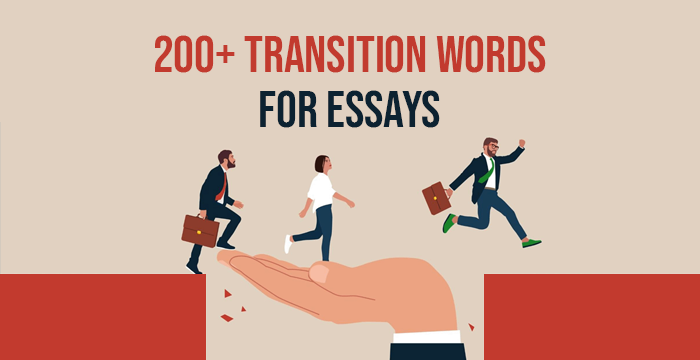
What are transition words?
Transition words are linking words that help collect different sentences and thoughts in an essay or writing. They provide a way to move from one idea to another, building relationships between other document parts. During the preparation of the report, to provide high-quality writing that can be quickly understood and read by the readers, the use of phrases and transition words becomes very necessary. They also help give an idea for the following information that may be presented in the article. The transition words should be used wisely, as they can make or break the flow of an entire essay.
Types of transition words:
Three transition words are used to draft an article or essay. The type of transition word depends on the complexity, kind of text and length of the word.
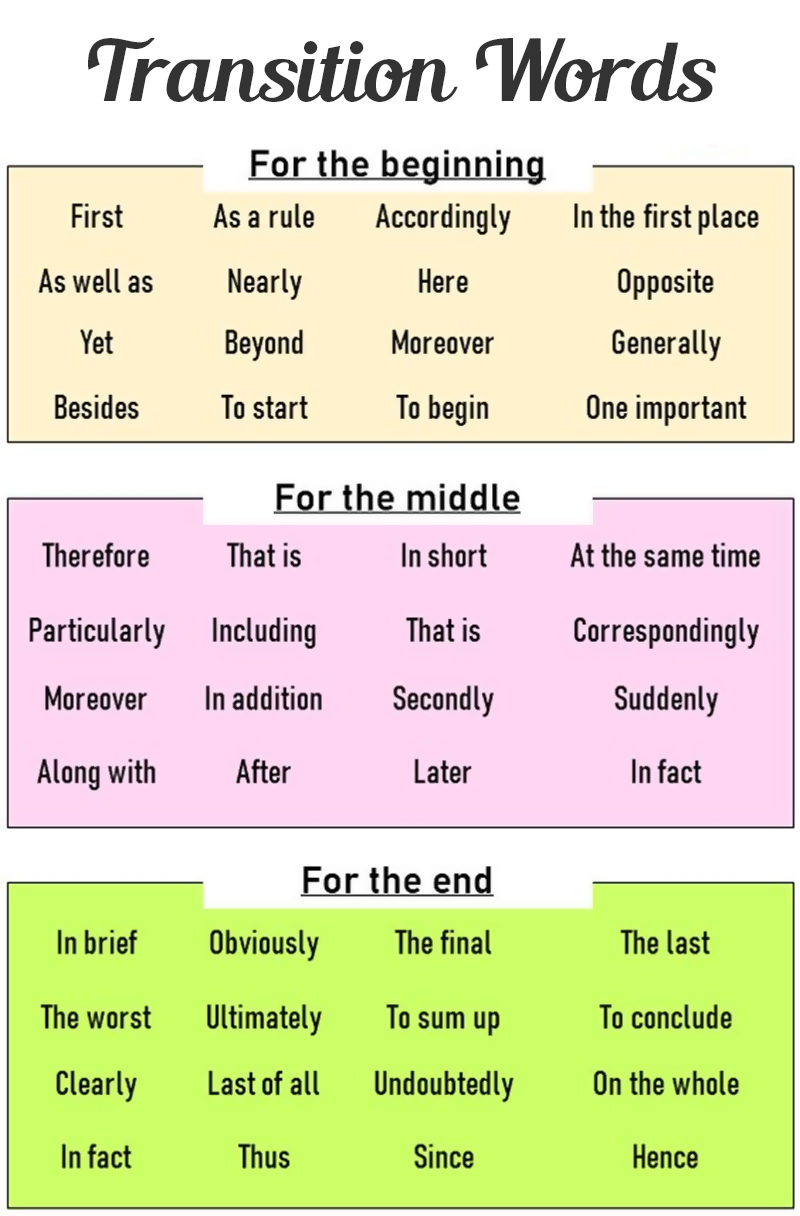
- Transition between two different sections: In the case of long documents and essays, the use of transition paragraphs helps in summarising a particular area of the paper to the readers. It also helps in linking the following information in the article. Some of these words are: In the following section, to develop more knowledge, etc.
- Transition between two different paragraphs: This type of transition word generally links two separate paragraphs in the essay. The transition helps summarise the information provided in the first paragraph and connect it with the data presented in the next section. Examples of this type of transition words are, in contrast, similarly, furthermore, and many more.
- Transition in the same paragraph: They help prepare the essay's readers for the following information they will receive. These are generally single-phrase transition words such as the in particular, for instance, moreover, however, and many more.
Different types of transition word:
The following table shows the different types of transition words and their benefits.
Tips for using transition
- The transition words should be used at the start of the paragraph.
- To generate a relation between the evidence described in the essay and the result found in the writing.
- Use the end of each paragraph to provide the opening for the next section.
- Transition words should be used at the start of the introductory paragraph and summarise the ending of each section.
- Transition words can be used in the summary to conclude the entire work.
Things to remember while using transition words in an essay
- It is important to remember that the overuse of transition words can make them irrelevant in the essay. The excessive use of transition words can make the readers feel that they need to give the readers more chances to create a connection in the essay.
- It is also important to use the correct transition word in the essay. As the transition words connect the different paragraphs in the project, the use of the wrong transition word can make the entire essay unsuitable.
- Understanding which words can be used at the beginning of an essay is essential. Sometimes, transition words are used to begin a paragraph; however, they are very informal and should not be used in academic papers. For instance, starting a section with something other than and, because, or but in academic writing is better.
200 transitional words for essays:
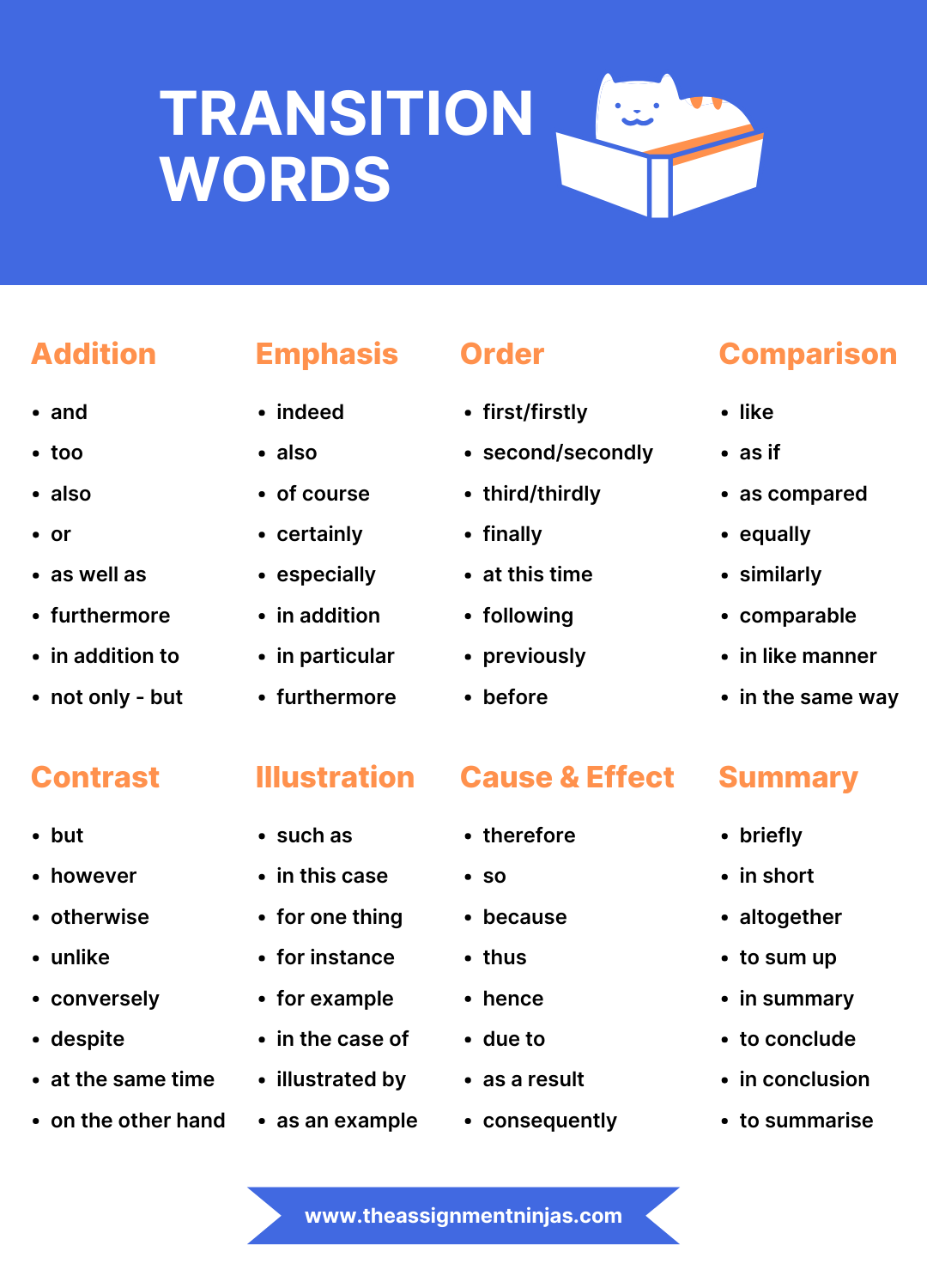
- In addition to
- As a matter of fact
- Furthermore
- Equally important
- In the same way
- Comparatively
- Correspondingly
- Not only… but also
- In like manner
Order or sequence
- Firstly… secondly… thirdly
- Simultaneously
- Next… then… finally
- In the first place… in the second place
- Formerly… presently
- To begin with
- Sooner… later
- By the time
Contradiction, opposition
- While it may be true
- On the one hand… on the other hand
- Nonetheless
- In contrast
- Notwithstanding
- On the contrary
- Nevertheless
- Although this may be true
- Even though
Cause and effect
- As a result
- Consequently
- Accordingly
- With this in mind
- To the end that
- In light of
- For example
- For instance
- Specifically
- To illustrate
- To demonstrate
- As an example
- Particularly
Space, time, and location
- Subsequently
- Immediately after
Summary and conclusion
- In conclusion
- To conclude
- To summarise
- On the whole
- In other words
Transition Words PDF Download: Click Here
Editor's choice, 200 best 5 minute speech topic ideas, 45+ experimental research topics and examples for school & college students, 50+ best research topics on humanities & social sciences, 15+ most useful websites for college students in 2023, how to make a cover page for the assignment, 100+ latest persuasive speech topics & ideas for 2023, how to write bibliography for project complete guide for students.
We are here to help you!
Explore Topics
Related articles.
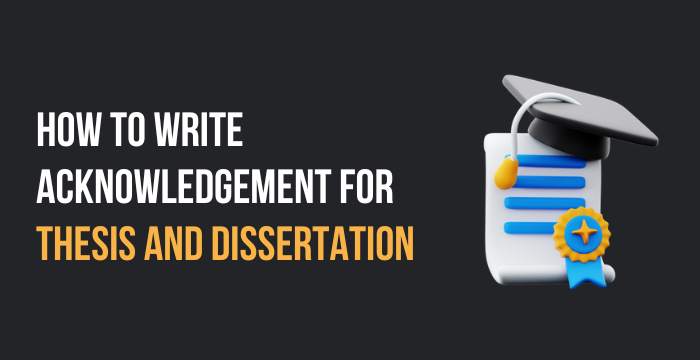
How To Write Acknowledgement For Thesis And Dissertation?
What is the importance of acknowledgement for a dissertation and thesis?The ackn...
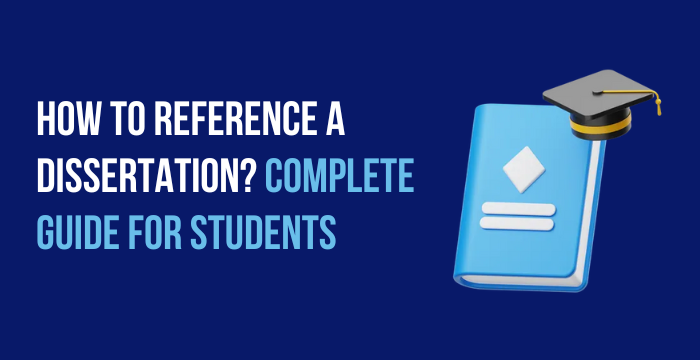
How to Reference a Dissertation - Complete Guide For Students
What do you mean by a dissertation referencing?Referencing is an essential eleme...

Maths Project Ideas For Students 2023
Mathematics plays a vital role in increasing the creative ability of the student...
How To Write An Essay
Transition Words For Essays

Transition Words for Essays - An Ultimate List
12 min read
Published on: Jan 1, 2021
Last updated on: Jan 30, 2024

People also read
How To Write An Essay - "The Secret To Craft an A+ Essay"
Learn How to Title an Essay Like a Professional Writer
How to Write an Essay Outline Like a Pro
Essay Format - An Easy Guide & Examples
What is a Thesis Statement, and How is it Written? - Know Here
Arguable and Strong Thesis Statement Examples for Your Essay
200+ Creative Hook Examples: Ready, Set, Hook
A Guide to Writing a 1000 Word Essay for School or College
All You Need to Know About a 500-word Essay
Different Types of Essay: Definition With Best Examples
Writing an Essay Introduction - Step by Step Guide
Jumpstart Your Writing with These Proven Strategies on How to Start an Essay
Learn How to Write a Topic Sentence that Stands Out
A Guide to Crafting an Impactful Conclusion for Your Essay
Amazing Essay Topics & Ideas for Your Next Project (2024)
Explore the Different Types of Sentences with Examples
Share this article
Are you tired of reading essays that feel disjointed and difficult to follow? Do you find yourself struggling to connect your ideas smoothly and effectively?
If so, then you're in luck, because today we're going to take a closer look at the magic of transition words.
In this blog, we'll cover different types of transition words and their precise usage, and how they can elevate your writing. By the end, you'll have the tools to captivate your readers and leave a lasting impression.
Let's dive in!
On This Page On This Page -->
What are Transition Words?
Transition words are linking words used to connect sentences and ideas in the content. They help the audience move from one idea to another, building a coherent relationship within the document.
When writing an essay , it is essential to make sure that the information provided is readable and understandable by the readers. For this purpose, explicit language, transition words, and phrases are used.
Moreover, these words set a base for the idea that is going to be discussed next.
Transition words can either make or break the entire essay. It is mandatory to keep in view that not every sentence in your essay needs a transitional phrase.
Types of Transitions
Generally, there are three types of transitions that are used while drafting a piece of document. Depending on the length, complexity, and kind of text, transitions can take the following form:
- Transition Between Sections - When your document is lengthy, transition paragraphs are used to summarize a particular section for the readers. In addition to this, it also links the information that is to be shared next.
For example:
"In the following section..." "Moving on to..." "Now, let's explore..." "Turning our attention to..." "To delve deeper, we will now examine..."
- Transition Between Paragraphs - The transition between paragraphs is when you logically connect the two paragraphs. This connection summarizes the paragraphâs primary concern and links it to the next idea of the other paragraph.
"Furthermore..." "On the other hand..." "Similarly..." "In contrast..." "Moreover..." "Additionally..." "In addition to..." "Conversely..." "Likewise..." "In a similar vein...
- Transition Within Paragraphs - They act as cues for the readers to prepare them for what is coming next. They are usually single words or small phrases.
"For instance..." "In particular..." "To illustrate..." "Additionally..." "Moreover..." "Furthermore..." "On the contrary..." "However..." "In contrast..." "In other words..."

Paper Due? Why Suffer? That's our Job!
Types of Transition Words
Here's a table showcasing different types of transition words and their corresponding functions:
Transition Words For Different Types of Essays
Transitional words depend on the relationship you want to convey to the audience about the ideas and paragraphs. Below is a list of words and phrases that can be used to link different sentences, paragraphs, and sections.
Identify which transition expression you want to share for your logical relationship.
Transition Words for Argumentative Essay
- In the same way
- Equally important
- Furthermore
- Comparatively
- Additionally
- In addition
- Not only...but also
Transition Words for Compare and Contrast Essay
- In contrast
- Different from
- On the contrary
- In spite of
Transition Words for Informative Essay
- Provided that
- With this in mind
- For the purpose of
- In the hope that
- In order to
- With this intention
Transition Words for College Essays
- In other words
- By all means
- To demonstrate
- As in illustration
- To put it another way
Transition Words for Cause and Effect Essay
- As a result
- For this reason
- Because the
- Under those circumstances
- Accordingly
- Consequently
Transition Words for Expository Essay
- Not long after that
- Specifically
- To begin with
- Without doubt
- Undoubtedly
- Due to circumstances
- In similar fashion
Transition Words for Different Parts of Essay
Here's a table listing transition words for different parts of an essay:
How Transitions work
Transitions work by creating a bridge between ideas, sentences, paragraphs, or sections in your essay. They help to establish logical connections and guide the reader through the flow of your writing.
Here's how transitions work:
- Coherence : Transitions create smooth connections between ideas, ensuring a coherent flow in your writing.
- Signal Relationships: Transitions clarify how ideas are related, such as cause and effect, comparison, contrast, or sequence.
- Guide the Reader: It acts as signpost, guiding readers through your essay and indicating the direction of your thoughts.
- Enhance Clarity: Transitions improve clarity by organizing ideas and helping readers understand logical progression.
- Improve Flow: It ensures a seamless flow between sentences, paragraphs, and sections, preventing choppiness.
- Emphasize Key Points: Transitions can be used strategically to highlight important ideas and make them more impactful.
Let's consider an example:
In the above example, transitions like " one such source " connect the idea of solar power to renewable energy sources. " Similarly " then introduces the concept of wind power, creating a logical progression. These transitions help readers follow the flow of ideas and understand the relationships between different energy sources.
Tips to Use Transition Words in your Essay
Here are some tips to effectively use transition words in your essay:
- Understand the Purpose: Familiarize yourself with the different types and functions of transition words, phrases, or sentences. Recognize how they connect ideas, provide structure, and indicate relationships between different parts of your essay.
- Plan your Essay Structure: Before you start writing, outline the main sections, paragraphs, and points you want to cover. Consider where transition words can be used to improve the flow and coherence of your essay.
- Use Transition Words Appropriately: Ensure that the transition word you choose accurately reflects the relationship between ideas. Don't force a transition where it doesn't fit naturally.
- Vary Transition Words: Avoid repetitive or excessive use of the same transition word throughout your essay. Use a variety of transition words to maintain reader interest and enhance overall readability.
- Pay Attention to Placement: Place transition words at the beginning, middle, or end of sentences, depending on the desired effect. Consider the logical flow of your ideas and choose the appropriate placement for each transition word.
- Use Transitional Phrases: Instead of using single transition words, consider incorporating transitional phrases or clauses. These can provide more context and clarity, strengthening the connection between ideas.
- Revise and Edit: After completing your essay, review it for the effectiveness and smoothness of transitions. Ensure that they serve their purpose in guiding the reader and enhancing the overall coherence of your writing.
- Seek Feedback: Share your essay with others and ask for feedback, specifically on the use of transition words. Others' perspectives can help you identify any areas that need improvement or where transitions could be strengthened.
To sum it up! While mastering transition words may require time and practice, it is a skill well worth developing. These words are crucial for creating coherence and flow in your essays. Throughout this blog, we have explored various transition words and phrases that can greatly enhance your writing.
Remember, practice makes perfect, so don't hesitate to apply these newfound skills in your future essays. You can utilize an AI essay writer to enhance and refine your writing skills.
If you still need assistance or have further inquiries, our team at CollegeEssay.org is available to provide legit essay writing service .
Contact us today, and let us be a part of your journey toward academic excellence!
Barbara P (Literature, Marketing)
Barbara is a highly educated and qualified author with a Ph.D. in public health from an Ivy League university. She has spent a significant amount of time working in the medical field, conducting a thorough study on a variety of health issues. Her work has been published in several major publications.
Paper Due? Why Suffer? That’s our Job!

Keep reading

- Privacy Policy
- Cookies Policy
- Terms of Use
- Refunds & Cancellations
- Our Writers
- Success Stories
- Our Guarantees
- Affiliate Program
- Referral Program
- AI Essay Writer
Disclaimer: All client orders are completed by our team of highly qualified human writers. The essays and papers provided by us are not to be used for submission but rather as learning models only.
- Video Explanations
- Printable Worksheets
- ArgoPrep for Families
- ArgoPrep for Educators
- Promoting Learner Variability
- Purchase Workbooks
- SHSAT Program
- What is SHSAT?
- Reading Comprehension
- SHSAT Test Dates
- SHSAT Test FAQ
- SHSAT Practice Test
ENTER BELOW FOR ARGOPREP'S FREE WEEKLY GIVEAWAYS. EVERY WEEK!
FREE 100$ in books to a family!
Transitional Words and Phrases: A Quick Review
Agreement words, sequencing words, cause and effect words, contrast words, conclusion words, do you want to become a stronger writer, in conclusion (see what i did there).
Why are certain literary devices, like transitional words, important? Does using these words and phrases truly set writers apart? Can a reader discover the intended meanings of writing when these words and phrases are absent?
One of the evening rituals in our home is to retell the day’s events to each other before bedtime. My husband will tell us what happened at work, while my daughter may talk about what happened on the playground.
Of course, because we are invested in each other’s lives, we follow the story to the best of our ability. But what happens when the storyteller is like my son (who is 2)?
Because his speech is just developing, he can’t retell the day’s events with detail or transitions, because he simply doesn’t have those skills yet.
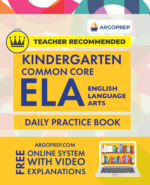
Common Core Kindergarten ELA Workbook: Daily Practice
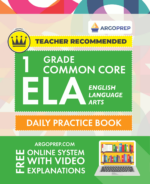
1st Grade Common Core ELA Workbook (English Language Arts)
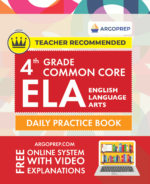
4th Grade Common Core ELA (English Language Arts): Daily Practice Workbook
As a result, we might not follow his “story” that clearly. We will know that he was happy (or sad), we can follow his points, but his story will lack the depth he might want to be understood at.
When writers lack skills in using transitional phrases, readers can encounter the same struggle . Transitional phrases are crucial to helping the reader along.
When transitional phrases are used, the reader can say, “Oh, okay, I understand that this point is important. Oh, and now we’re moving on”.
Just like a road trip from LA to New York follows a sequential path, writers must give their readers landmarks to follow.
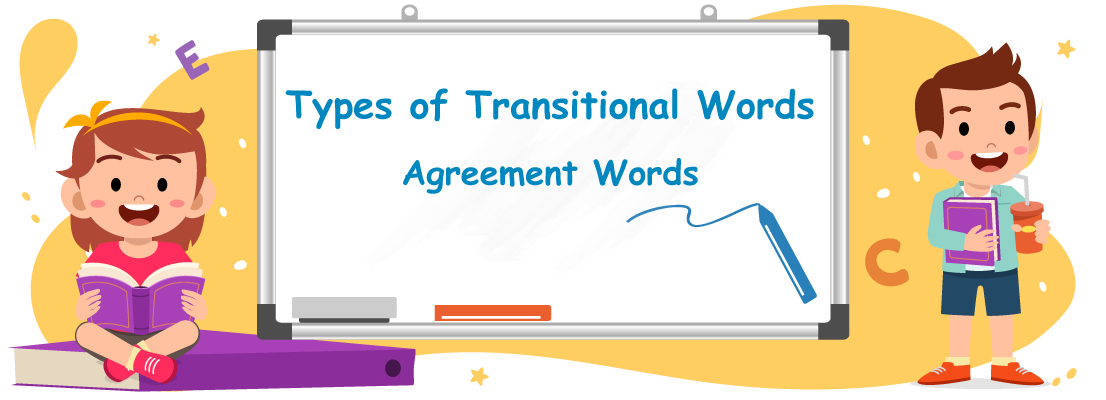
Types of Transitional Words
Transitional words are vital to high-quality writing because it allows the reader to follow the thought process of the writer. Since writers are usually not sitting in front of readers, eager to answer any clarifying questions during the reading, writers must use these devices to their advantage.
There are many ways that transitional words (and phrases) are organized into similar types, and I’ve compiled the most common types here:
Agreement words are used to demonstrate that two like ideas are in agreement with each other.
These words aim to create continuity amongst points within the writing.
Agreement Word Examples
- In addition,
- Corresponding
- Furthermore
- First, second, third
- Coupled with

Transition words like before, since, and by the time are characterized as “sequencing words.”
Sequencing words limit, restrict, and define time in the text . However, sequencing transitional words also serve as pacing essays. “First, second, and finally” serve as cues to the reader that they are progressing through the essay. These transition words are indicators that the reader is hitting the main points of the essay.
Sequencing Examples
- First of all…
- At this point
- Before this
- All of a sudden
- Occasionally
- Immediately
Cause and effect transition words create continuity in writing . Causation also serves as a place for a writer to provide a rationale behind their claims.
This is all just a fancy way of saying that after a writer makes a statement, causation transitions will allow them to say, “here’s what I mean” in more official terms.
These words should be used when you want to get from point A to point B. Words like, because, since, and therefore are all prime examples of cause and effect words.
Cause and Effect Examples
- Consequently
- In particular
- Accordingly

Words like yet, but, and unlike, are used in writing to indicate that there is evidence that disputes points being made . They are also used to point out different viewpoints or contrast themes in writing. When the writer is offering opposing views, they will use the “contrasting” transitional words.
Contrast Word Examples
- At the same time
- Even though
- Nevertheless
- On the other hand
When kids are first learning transition words, the conclusion words are some of the easier to remember. A simple, “In conclusion,” and you have successfully transitioned to the end of the writing.
Conclusion words include any words that serve to summarize, conclude, and wrap up writing. They will review anything that was covered in writing and effectively bring the writing to a close.
Conclusion Word Examples
- To summarize
- Given these points
- In the final analysis
- As can be seen

Being an effective writer is a skill that can serve people for their entire lives. In the age of technology, being able to communicate through the written word is becoming a skill that every graduate should have a strong understanding of.
Of course, not every writer aims to become an academic essayist, but being able to articulate thoughts in emails, letters, and even Facebook posts, is a skill that every person should have.
Do you wish that you (or your child) were more persuasive writers? Let ArgoPrep help! ArgoPrep has comprehensive online and hardcopy workbooks designed to help you become a more effective communicator.
- 30,000+ Practice Questions
- 500+ Video Lectures
- 15,000+ Video Explanations
Get up to 70% off on Yearly and Lifetime plans.
15 minutes a day keeps your child’s brain sharp!
With activities centered around correct usage, mechanics, and yes, transitional words and phrases, ArgoPrep is prepared to give you the foundation to become a stronger writer.

Transition words, like frosting on a cake, make a piece of writing more palatable. Instead of confusing readers with a lot of text that doesn’t blend, transitions serve to make the writing smooth.
There are many different kinds of transition words, and they all serve unique purposes. It is important to make sure your desired delivery is clear when writing, so take care in selecting transition words that will reinforce your writing.
As an educator, I find myself thinking that transition words are something that students should know for standardized testing. The fact is, transition words are crucial for all adults to use each day.
Whether you’re writing a letter to an HOA or an email to a boss, clear and understandable writing will help you communicate your thoughts despite not being there in person.
Transition words are an essential piece of any piece of strong writing. Want to more about becoming a stronger writer? Check out the informative library of topics over at the ArgoPrep blog for more!
Shipping calculated at checkout.
- - Unlimited access to all K8 printable worksheets and answer sheets.
- - Premium access to K-8 Math and ELA Video Lectures, Drills and Practice questions.
- - Progress tracking for your child.
- - One premium access to all family members!
Reading Worksheets, Spelling, Grammar, Comprehension, Lesson Plans
Transition Words: Complete the Sentence
About this worksheet:.
In this printable activity, students use transition words to complete each sentence. Transition words are used to connect different ideas to show a connection or a difference. This activity is ideal for middle school but can be used where appropriate.
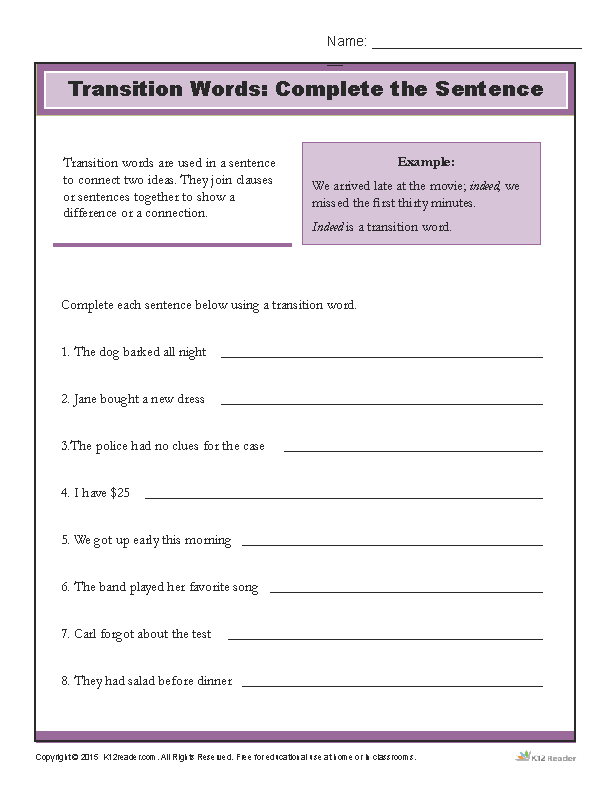

IMAGES
VIDEO
COMMENTS
33 Transition Words and Phrases. 'Besides,' 'furthermore,' 'although,' and other words to help you jump from one idea to the next. Transitional terms give writers the opportunity to prepare readers for a new idea, connecting the previous sentence to the next one. Many transitional words are nearly synonymous: words that broadly indicate that ...
Transitional words and phrases can create powerful links between ideas in your paper and can help your reader understand the logic of your paper. However, these words all have different meanings, nuances, and connotations. Before using a particular transitional word in your paper, be sure you understand its meaning and usage completely and be sure…
Examples of high school transition words. Using transitional words properly is crucial to the development of good writing composition skills. By the 8th grade and high school, students should have a strong grasp of common transition words and use them in their essays. Use the following words and phrases in the following circumstances. Cause ...
Example sentence. Transition words and phrases. Addition. We found that the mixture was effective. Moreover, it appeared to have additional effects we had not predicted. indeed, furthermore, moreover, additionally, and, also, both x and y, not only x but also y, besides x, in fact. Introduction.
Transition Words for Analysis Essays. 11. Conclusion Transition Words for Essays. 12. Beginning Transition Words for Essays. 13. Paragraph Transition Words for Essays. 14. Transition Words for Quotes in Essays.
Transition sentence This paragraph… Further evidence in support of this hypothesis is provided by Smith (2019). …complements the previous one, providing more support for the same idea. However, Patel's arguments are not the final word on the matter. …contradicts the previous one by presenting new evidence related to the previous discussion. Having established the relationship between ...
Here are some of the most common contrast transition words for essays, followed by examples: but. however. in spite of. on the one hand/on the other hand. in contrast. on the contrary. still. yet.
Nevertheless. On the contrary. Example: Still, it would be a terrible waste of tomatoes, so we won't pelt the politicians. Along with the argument for or against something, is the expansion of an idea. These transitions help lay the foundation for taking an idea or thought, then adding more to it.
Transition words for essays with examples. Here are examples of sentences using each of the transition words for cause: Additionally: "She enjoys playing the piano. Additionally, she is proficient in playing the guitar.". Furthermore: "The research indicated a positive correlation between exercise and mental health.
Transitional words and phrases are useful tools that help establish relationships between ideas. Including transitions helps readers follow a narrative, understand an idea as it develops throughout an essay, and keep up with the logic ... Students often fnd that their grades improve when they take notes _____ a grade of B can become an A once ...
Page 9 "Transitional Words & Phrases - Narratives" Page 10 "Transitional Words & Phrases - Narratives" - with Fun Dots background Page 11 Plain text handout of transitional words and phrases for each piece of writing, grouped by standard Page 12 "Transitional Words & Phrases" - includes all (rather than have 3 separate charts)
Use our information and resources surrounding transition words for classrooms and learners everywhere! Printable worksheets on each category are available. ... Transition Words; Essay Introductions; Writing Conclusions; Writing Prompts; ... 4th and 5th Grade, 6th - 8th Grade, Grades K-12 CCSS Code(s): W.5.2.c, W.6.2.c
Here are a few types: Addition: These transitions add information or ideas. Examples include "furthermore," "in addition," and "moreover.". Contrast: Used to show difference or opposition. Words like "although," "despite," and "regardless" come into play here. Cause and Effect: These signify a causal relationship.
Along with transition words, rhetorical devices and literary devices are other tools to consider during this stage of essay writing. Transition Words for College Essays. While this list will be a useful tool for all types of essay writing it will be particularly helpful when it comes to finding the right transition words for college essays. The ...
The following table shows the different types of transition words and their benefits. Type. Example Words/Phrases. Function. Addition. Moreover, furthermore, Additionally, In addition to. Adds ideas or information. Contrast. On the other hand, However, In contrast, Conversely.
Try adding these concluding phrases and conclusion transition words to your repertoire: all in all. all things considered. altogether. finally. in brief. in conclusion. in essence. in short.
Vary Transition Words: Avoid repetitive or excessive use of the same transition word throughout your essay. Use a variety of transition words to maintain reader interest and enhance overall readability. Pay Attention to Placement: Place transition words at the beginning, middle, or end of sentences, depending on the desired effect. Consider the ...
"First, second, and finally" serve as cues to the reader that they are progressing through the essay. These transition words are indicators that the reader is hitting the main points of the essay. ... 12 Weeks of Math, Reading, Science, Logic, and Fitness Updated for Summer 2023, prepare your child for Grade 6 with our award-winning Kids ...
Transition words are commonly used to indicate an order or sequence. This is common in stories and instructional texts, as they indicate to the reader what order the events occurred in. For example, First, next, then, second and then. Check out these simple examples to see order transition words in action.
Transition words are used in a sentence to connect two ideas. They join clauses or sentences together to show a difference or a connection. In this printable activity, students circle the transition words and phrases in the sentences below. Great for middle school but can be used where appropriate. Click to View/Print Worksheet. Get Worksheet.
About this Worksheet: In this printable activity, students use transition words to complete each sentence. Transition words are used to connect different ideas to show a connection or a difference. This activity is ideal for middle school but can be used where appropriate. Click to View/Print Worksheet. Get Worksheet.